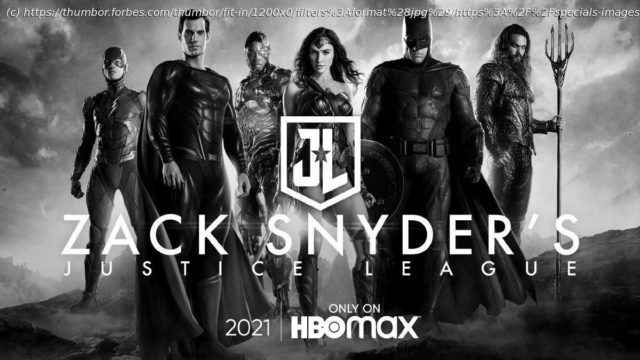The ultimate DC Comics movie has arrived, and it is more than anyone expected or hoped for.
In 2009, I exited a screening of Zack Snyder’s Watchmen thinking Warner Bros. should put Snyder in charge of developing an entire shared DC cinematic universe akin to what Marvel Studios was setting up. Watchmen is a true masterpiece in the superhero film genre, representing a perfect visual and tonal approach for also adapting the larger array of DC Comics superheroes. After 2013’s Man of Steel, I was convinced Snyder was the right person for the job. And now, Zack Snyder’s Justice League has arrived as the living embodiment of the larger DC Universe. There are no immediate box office details to discuss, since the film is releasing on HBO Max, but there are still some interesting financial details to consider. Firstly, if the critical reception and audience reactions are good enough (and I am pretty sure they will be, which I’ll discuss shortly), then might Warner consider a limited theatrical run in Dolby Cinemas and IMAX theaters? When theaters start reopening to actual safe attendance, there is going to be some initial reluctance rather than a mad dash for seats. One way theaters can maximize initial openings post-pandemic [note: I believe the current reopening attempt has a strong chance of causing a new surge of COVID cases, leading to renewed lockdowns] is to screen films that have a loyal and eager fanbase likely to attract a good audience. Zack Snyder’s Justice League (or ZSJL, as it’s referred to by fans on social media, and as I’ll refer to it here to save time and space) is exactly such a film. A single week or weekend of screenings would generate millions of dollars, for very little effort by the studio. The bigger question about financials is how much ZSJL might drive HBO Max subscriptions. For that, we’ll have to largely rely on anecdotal claims among the fans, plus the word of the studio itself if/when they announce any numbers related to it. My guess is a lot of DC fans who hadn’t already subscribed yet to HBO Max will do so in the days leading up to — and immediately after — release of ZSJL. Likewise, the even bigger question is whether mainstream viewers who aren’t already Snyder fans of DC fans will be motivated to tune in. And to answer that, I have to get into the review of the film itself, because I believe ZSJL is going to be a big hit with mainstream audiences who will be shocked at how great the film is, confused by why the previous studio leadership refused to release it (and why they released a far lesser version of the film in theaters), and most of all eager to see more of this story. So I expect HBO Max to announce high subscriber numbers surrounding the release of ZSJL, and it helps that it arrives just a week before the HBO Max premiere of Godzilla vs. Kong, which will surely also drive subscriptions. All of this press coverage and marketing combines in general to help further remind audiences about HBO Max and all of the reasons to subscribe. Yes, some fans insist they’ll just sign up to HBO Max to watch Zack Snyder’s Justice League, but will they really unsubscribe after seeing it, rendering themselves unable to rewatch it at will? Will they skip all of the other DC content on HBO Max as well? Will they risk creating the impression that Snyder’s vision for DC didn’t sustain subscriptions and thus decrease the chances the studio might rethink their decision about making a sequel to ZSJL or doing other spinoffs set within the “Snyderverse?” I think a large number of fans and general audience who subscribe primarily for ZSJL will stick around, to rewatch it and to see the other content on the streaming service, and in hopes of sending a loud message that more “Snyderverse” will correspond with more subscribers for a longer time. Consider for a moment that HBO Max is expected to reach 150 million subscriber activations by 2025. That would generate more than $2 billion in revenue per month, give or take. Another way of thinking about it is, imagine if WB released two films topping $1 billion in theaters every single month of the year. Forever. Even a conservative estimate of 100 million subscribers at a lowball monthly rate of $10 would put the studio over $1 billion every month from subscription revenue. The point being, while overhead and other costs do eat into that, it ultimately signifies how much more lucrative direct-to-consumer streaming options are for studios capable of competing at that scale (20th Century Fox for example determined over time they wouldn’t be able to compete at the scale necessary to remain a dominant studio force in the changing landscape, so they sold to Disney). As I’ve pointed out before, streaming content requires smaller budgets and far smaller marketing expenditures, and they can reach a larger audience wherever the audience happens to be at any given moment. No theatrical middle-men who take 40-50% of the revenue, just straight to consumers. If ZSJL can drive business to HBO Max, then it more than justifies its existence and speaks to the need for Warner to look for ways to bring more big-branded content exclusively to the streaming platform, so viewers showing up for one such show have added incentives to stick around.
Домой
United States
USA — Art Review: Zack Snyder’s Justice League Is The Ultimate DC Superhero Movie






